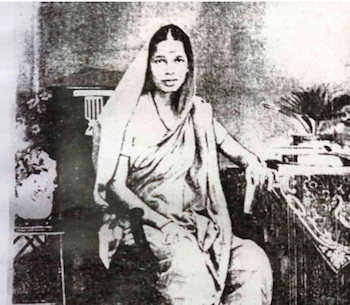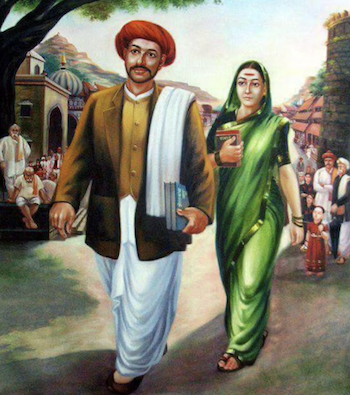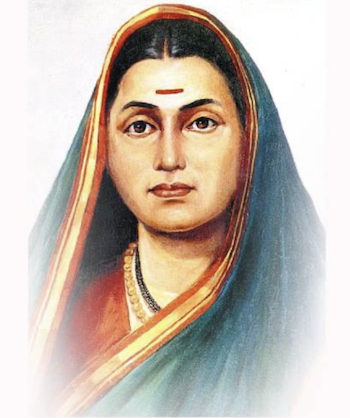
Savitribai Phule was born on January 3, 1831, into an oppressed caste in the small town of Naigaon (located in Maharashtra, India). She was a child bride, married at the age of nine, and denied an education for many of her formative years. Despite all these setbacks, Phule became one of India’s most prominent social reformers and India’s first female teacher.
In the early nineteenth century, India was nothing like the way it is today. The “crown jewel” of the British empire was not yet independent. Phule was born into a farming family that belonged to a lower caste. Her father was a very traditional man—a product of the extremely oppressive social norms that permeated central India at this time. Women at this time were treated as a source of sin. It was believed that women were naturally unintelligent, and education would only lead them to even more sinful behavior. It was also thought that they would be rude to the men in their lives, and bring unhappiness to their families. Savtribai’s father heavily subscribed to these beliefs, and her life was shaped by them. Like all the other young girls in her community, it was expected that she would marry at a young age. As such, Savitribai was married to Jyotirao (a soon-to-be activist himself) in 1840—at the age of 9.
Prior to marriage, Savitribai did not have access to an education. One day, she came across an English book (that she was unable to read) and began leafing through the pages. Shortly after, she was caught red-handed by her father, who snatched the book from her, threw it far away, and demanded that she never touch another book again. During this time, education and literacy was a privilege that belonged only to upper caste men.

After she married Jyotirao, he observed her eagerness to read and educate herself. Although she was still unable to attend school, he provided her with an informal education. Soon, she was able to read and write at a high level. As she learned more and more, Savitribai started to develop a very intense desire to teach. Unlike most husbands of child brides at the time, Jyotirao was supportive of her dreams and helped her get enrolled at a teacher’s training institute in Pune, India. Just to be safe, Savitribai also enrolled herself in a training program that was run by an American missionary. After passing her examination in 1847, Phule had finally become a qualified teacher.
With the help of her husband and his sister, Savitribai opened a school for young girls in Pune. Although boys did study there, they were far outnumbered by girls. The curriculum was comprehensive and well-made, including classes on all four core subjects (mathematics, reading, science, and social studies). Because of the strides the couple was making in providing education for impoverished young girls, Savitribai and Jyotirao faced immense backlash from local communities. In fact, Savitribai was known to carry extra, clean clothes with her to school every day because she was pelted with dirt and rocks every day on her walk to work. The backlash came from loved ones as well. In 1839, as a result of pressure from others, Savitribai’s father demanded that the couple move out of his home, as he believed the work they were doing—educating girls—was a sin.
Nonetheless, Savitribai’s school was extremely successful. By 1852, she had three fully operational locations around the city of Pune. In a time when women receiving an education was heavily stigmatized, around 150 girls were attending Phule’s schools.
Eventually, Phule expanded her horizons to the realm of social service, opening a care center for pregnant survivors of sexual assault. Here, victims would have a safe place to deliver their children and recover after giving birth. In addition, Phule also began writing. A book of her poems, called Kavya Phule (1841), drew awareness to the struggles she faced as a child and as a working woman. These works furthered the movement for the education of women and inspired readers to condemn caste and gender discrimination. The poems also served as a call for marginalized groups to do whatever they could to obtain knowledge and get an education. On top of caste and gender discrimination, Savitribai Phule dedicated time to fighting against child marriage in her community. She publicly spoke out against the practice on multiple occasions and educated girls who attended her school about all the other options they had aside from child marriage.

Later in life, Phule opened a clinic in the outskirts of Pune to treat patients that had been suffering from a multitude of deadly diseases. Unfortunately, Phule herself contracted one of these illnesses while serving patients and passed away in her hometown on March 10, 1897.
Although she was met with opposition in the beginning, Savitribai Phule’s relentless efforts in eradicating the age-old challenges of women continue to inspire future generations. In 2015, Pune University was renamed to Savitribai Phule Pune University. Since her death, residents of her home state celebrate her birthday each year, and it has since become a vibrant feminist tradition in Maharashtra. On this day, women dress up like her, display posters outside their homes, make sweets, and decorate their homes and neighborhoods. Today, the schools founded by Phule are still open. To those in her area, Phule serves as a reminder of what one Maharashtrian woman can do if she refuses to give up. They look back on the changes she made with gratitude and reverence. After all, if it were not for her, many of them would never set foot inside a schoolhouse.
Savitribai Phule’s legacy is one of tireless advocacy and grassroots activism, but also immense courage. Despite the pressure she faced from those who wanted to maintain the status quo, Phule reminded women around her of the power of education. She challenged and transformed oppressive structures, setting in motion a wave of social change that continues to sweep through India today.
Why Did I Choose to Research Savitribai Phule?
Education has always been essential to me, and the idea that some may not have access to it simply because of their gender is unimaginable. Although this is still an issue, I wanted to learn more about people from my cultural background who had made sizable contributions to the fight for women’s education. I came across a short biography of Savitrbai Phule in the Times of India, and the idea for my next iFeminist article was born.
Works Cited
Vskteam. “Savitribai Phule, a Social Reformer and Teacher.” VSK Telangana, 5 Jan. 2024, http://archives.vsktelangana.org/savitribai-phule-a-social-reformer-and-teacher
“Savitribai Phule 126th Death Anniversary: Here Are 8 Facts about India’s First Woman Teacher.” The Economic Times, 2024, http://economictimes.indiatimes.com/news/new-updates/savitribai-phule-126th-death-anniversary-here-are-8-facts-about-indias-first-woman-teacher/articleshow/98535607.cms?from=mdr
“Savitribai Phule Biography: All about the First Female Teacher of India & Her Work for Girls Education, Death & More.” Jagranjosh.Com, 3 Jan. 2022, http://www.jagranjosh.com/general-knowledge/savitribai-phule-biography-husband-children-work-for-girls-education-schools-awards-death-1641193310-1#
“Savitribai Phule - Google Arts & Culture.” Google, Google, http://artsandculture.google.com/story/savitribai-phule-zubaan/mAWBW6eHcTWSLg?hl=en Accessed 30 July 2024.
This article was published on 9/16/24